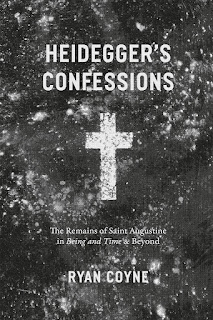Heidegger's Confession
Heidegger’s Confession, Ryan Coyne, 2015
This was a difficult read but also a rewarding one. It brought back some good memories of my early reading in philosophy. Glenn, your friend was right in identifying the book as a difficult read. I was not aware of the interest in either Paul or Augustine.
When I first read Heidegger, I thought of how much of his philosophy could be put into theological terms. What I now realize is that my thought would have been re-theologizing of Heidegger. If he is thinking of his version of existential philosophy as de-theologizing philosophy, I do not think he was successful. The notion of being thrown into existence contrasts with creation in the image of God and being-toward-death contrasts with the notion of eternity with God. His notion of the fallenness of Dasein through the temptation of inauthentic existence toward They, evidenced in everydayness, contrasts with the fallenness of humanity through the temptation to richer life in disobedience to God, especially in the failure to love God (Gen 3) and neighbor (Gen 4). His notion of the decision to resolutely face finitude and death contrasts with the decision of faith in what God has done for humanity in Jesus Christ. Conscience addresses the human being as guilty, having the impact of fracturing human existence. This guilt is the result of surrendering to everydayness and its inauthentic existence. I exist, I am, as guilty. My experience of care for the world leads me to a sense of indebtedness in failing to satisfy the claims of others upon my life. I can also be guilty in the sense of being responsible for something, such as, the Other becoming endangered in his or her existence. Such endangerment is separate from the traditional notion of transgression of a norm which then causes guilt. If I transgress a norm, I have not done my duty, and if I am indebted to the Other, then the Other does not have something owed. This “not” is an important aspect of guilt. These two sides of the ”not” of being guilty give unity to the care we have for the world. “I am” is not the result of my own accord, for I am thrown into the world. “I am” is not the result of me living in authenticity, but the result of the temptation of allowing They to shape my existence. Most significantly, however, “I am” as fallen from authentic self and into They and everydayness. His notion of the call of conscience contrasts with the notion of God having a vocation for each is us, an important aspect of which is to accept my guilty existence. What the author is suggesting is that in secularizing theological notions, Heidegger is still dependent upon a theological ontology for his existential philosophy. He used theology as his silent interlocutor, which is why so many of his concepts have religious overtones.
Heidegger wrestles with why theological concepts arise in Being and Time, which to Coyne is because he is unwilling to think of Being as intimately connected to beings. The fact that the later Heidegger is wrestling with this is his confession that he never left his early theological training behind. If we gain access to Being through beings, then access to Being would be through our experience of beings, which would be tradition. Metaphysics would be the history of Being, and the history of Being would be the cultural and material forces that determine our encounter with beings. The philosophy of religion becomes an investigation of the historically conditioned statements that are spiritual-meditative and deriving from religious communities. This approach lifts critical and analytical thought to a new level of thinking above its materiality and toward carving out new spaces for critical reflection. The point of such reflection is not reduction, but lifting critical thinking to new areas of thought, a lifting that occurs through engagement with spiritual and meditative thinking. Although the spiritual and analytical thinking is illogical from the standpoint of critical and analytical thinking, it is also the power of the religious community out of which theology arises. The philosophy of religion concerns itself with the transcendental essence of objects, building upon the historical and being a product of its historical findings. His main purpose was to find a basis for the philosophy of religion after Heidegger.
I appreciated the point that one can read tradition faithfully, draw from it, and even engage in the transformation of that tradition, while being faithful to both the tradition and to the moment in which one lives. Thus, reciting the creed is not necessarily being faithful if one abandons the need to communicate to a new historical setting.




Comments
Post a Comment